Book reviews

Paul Michael Garrett (2024) Social Work and Common Sense: A Critical Examination. London, Routledge.
‘This book undoubtedly builds upon previous excellent work from Garrett, in particular on “keywords” (for example Garrett 2018), and therefore regular followers of his will find this a valuable new contribution. However, in dealing with something as ubiquitous and fundamental as common sense, this book will grip a wide range of readers, including social work students, practitioners and academics, and also those outside the social work profession with an interest in common sense and how this comes to be deployed in a professional context such as social work. At a time when there is an increasing insistence in many areas of social work to delineate and narrow what is seen as appropriate and acceptable knowledge, Garrett’s consistent dedication to explore further horizons for social work knowledge and practice is consistently refreshing. The broad approach to the subject also makes the book relevant to social workers everywhere, regardless of geographic location or area of practice…Overall this is an engaging, worthwhile and at times challenging read, firmly in line with the high quality work we have come to expect from Garrett. I expect to return to this book frequently, as I do with much of his work’.
Joe Hanley, Practice: Social Work in Action, 2024
‘Paul Michael Garrett has made an important contribution to the renewal of the radical Marxist tradition in social work over the past twenty years…Garrett in this book has provided a valuable resource for all those who believe that “another social work is possible”. Here, as in his previous book Dissenting Social Work, he has demonstrated that we do not have to settle for the narrow, controlling and rationing approaches that have come to define neoliberal social work’.
Iain Ferguson, British Journal of Social Work, 2024
‘Paul Michael Garrett’s book is a great contribution to the field of social work very much in need of critical and radical theoretical perspectives. Social Work and Common Sense is timely and much needed in a time when the neoliberal reorganisation of social policy is increasingly embedded and dominant. More specifically, social work education, its curriculum and practices is being recast in neoliberal terms and the very existence of a social justice orientated social work risks becoming irrelevant. Indeed, given recent developments which are marginalising democracy, violating human rights and social justice, increasing racism, militarism and genocidal wars, Garrett’s book is a must-read book for students, educators and researchers of social work and social policy’.
Jessica Hanna Jönsson, Critical Social Policy, 2024
‘The book…offers a refreshingly critical perspective on social work education and practice. It encourages readers to reflect on and evaluate the foundational ideas [and it] makes a significant contribution to the understanding and development of the field of social work through its innovative and provocative approach. By challenging fundamental assumptions that are often accepted without question, the book opens up space for deep reflection and critical dialogue…Ultimately, this book is relevant for social work students, practitioners, academics, and anyone interested in the application of common sense within professional contexts, even if they do not work in the social field’
Alif Ilman Mansyur et al. Journal of Human Behavior in the Social Environment, 2024
‘I enjoyed reading the book and I can recommend it to anyone interested in social work, political philosophy, and even sociology or social anthropology’
Jiří Mertl, Czech and Slovak Social Work, 2024
‘Garrett is an academic and critical theorist who has played a key role in developing radical perspectives on the direction of his field…Social Work and Common Sense: A Critical Examination provides a rigorous and challenging analysis of how “common sense” assumptions become deeply embedded in professional practice. [Here he] aims to provide a theoretical framework that will lead to more emancipatory approaches focused on social justice, and his work is a valuable resource for social work practitioners, students and academics alike’
Ian Cummins, The Sociological Review, 2025
‘Paul Michael Garrett’s book presents an insightful and deeply critical analysis of the field of social work, offering an essential reading for students, educators, researchers in social work and social policy’
Giulia Turrina and Teresa Bertotti, Social Work Education, 2025
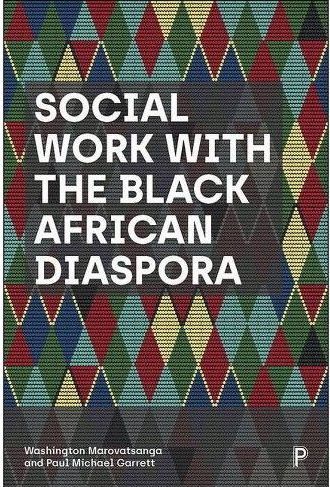
Washington Marovatsanga and Paul Michael Garrett (2022) Social Work with the Black African Diaspora. Bristol, Policy Press.
‘This book invites an honest, respectful, and critical rumination on social work theory and practice with Black Africans in western countries…It seeks to fuse multiple perspectives and philosophies on the disempowerment of the Black African diaspora because of universalised European hierarchies of power within and beyond the social work profession. In short, Social Work with the African Diaspora is a very important intellectual work. Indeed, it is effective and unique in that it is probably the only book of this kind currently available’.
Cynthia Okpokiri, Critical Social Policy, 2023
‘It is energising to see writers articulate how their positionality and political commitment influence their academic interests and writings. I think the reader will also appreciate the admission that while the writers share antiracism values and ethical concerns, they did not always agree on class, ‘race’ and culture questions…Despite its Irish focus, this book contributes to a global definition and understanding of social work. It enables a reader to understand key historical, social, and political factors that influence a nation-state’s relationship with minoritized people who require support by way of social work. With this substantial scholarship, this work provides a rich body of globally interconnected theories. By linking these to a comprehensive analysis of social workers’ contemporary practical experiences, the reader/students gain a deeper understanding of social work practice…I am a Black American trained social worker who grew up in the state’s care with more than half a dozen social workers assigned to my case throughout my childhood. This book affected me and gave me hope because it provides theoretical tools for progressive educators and practitioners to promote a greater awareness of ‘social change’ within social work education and training…I also feel this book offers the reader an urging and a warning: if social work education continues to rely on Eurocentric theoretical perspectives to inform and train social work students and practitioners, we delay and undermine the work that needs to commence to create environments for progressive social work practices’
Antoine Rogers, Ethics and Social Welfare, 2023
‘This book, Social Work with the Black African Diaspora, is a welcome addition to the library of emerging African social work scholars in western societies. It is a well-overdue contribution to combatting age-long racial and political knowledge in social work. Although the book is focused on Ireland, its theoretical terrain has significant resonance for the profession, society and, most importantly, policymakers worldwide’.
Oluwagbemiga Oyinlola, Aotearoa New Zealand Social Work, 2023
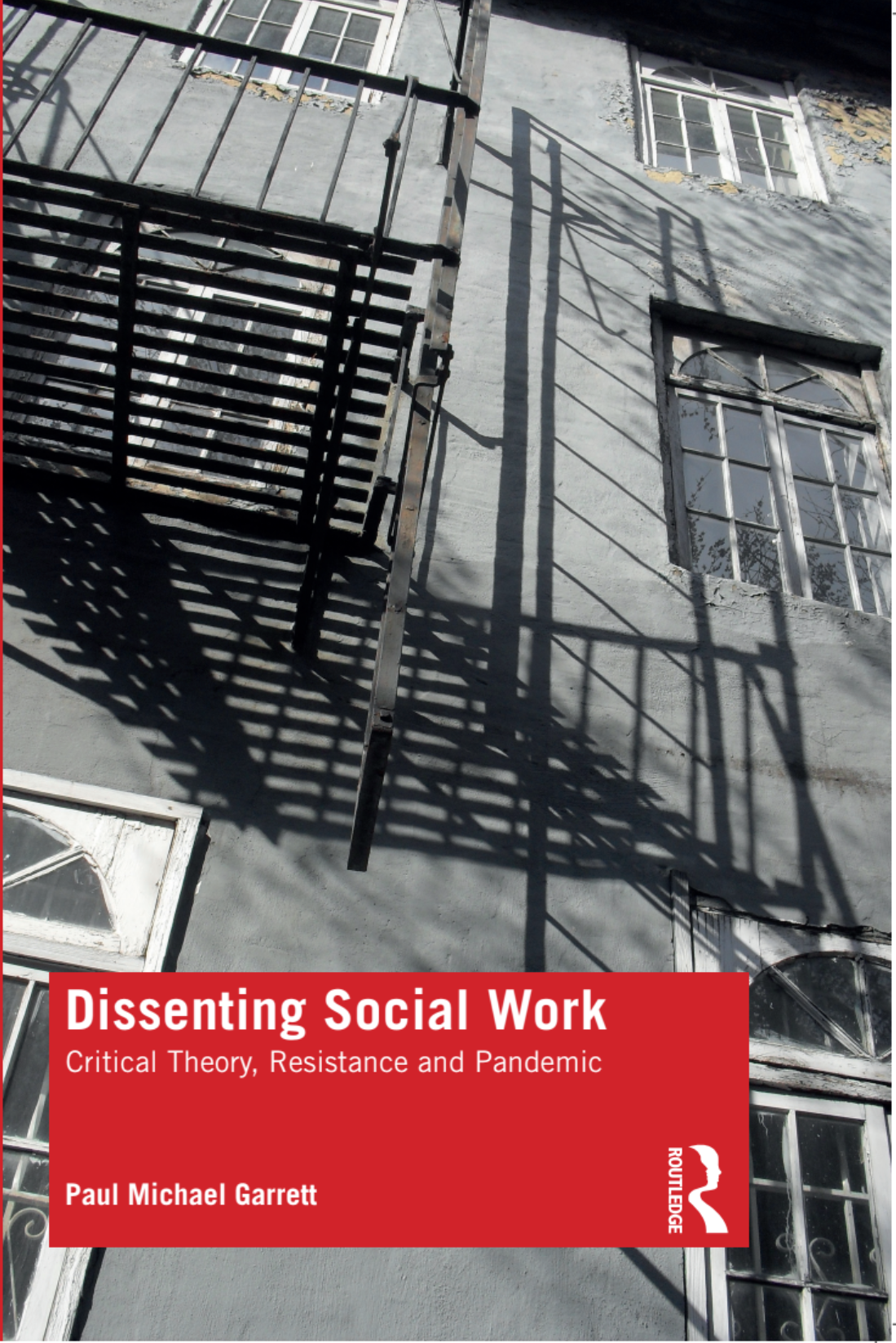
Paul Michael Garrett (2021) Dissenting Social Work: Critical Theory, Resistance and Pandemic (London: Routledge)
‘Paul Michael Garrett—probably the most important critical social work theorist in the English-speaking world—is a remarkable and very productive critical thinker. In this book he deals with issues of migration, the threat of neo-fascism, surveillance culture, colonialism, the Black Lives Matter movement, and the COVID-19 pandemic… Insightful and inspiring, thought-provoking and comprehensive in addressing timely critical issues for social work globally’.
Filipe Duarte, International Journal of Social Welfare, 2021
‘Garrett has a significant body of work and this is his latest book. In this 2021 publication, Garrett tackles some major challenges of our time and argues for social work solidarity and thoughtful activism…This book is an excellent resource for social work students at all levels, and for practitioners who still enjoy reading social work theory! For postgraduate students and researchers, Garrett always impeccably references both theoretical works and scholarly research and offers a rich resource for those seeking to make connections from sociological theory to social work in our current climate’.
Liz Beddoe, Aotearoa New Zealand Social Work, 2021
‘Drawing on a variety of theorists and covering various countries, it is certainly a compelling read. It deals with some of the main preoccupations of our time such as migration, the threat of neo-fascism, colonialism, surveillance culture, the Black Lives Matter movement and the Covid-19 pandemic...This is a book which will be essential reading for social work students, practitioners and others who want to make connections between social work, social theory and sociology’
(Steve Rogowski, Practice: Social Work in Action, 2021)
‘Nine chapters written with passion and erudition, but at the same time understandable and accessible…I found the whole book very inspiring. Perhaps this is because it arouses controversy, which in turn helps crystallise the reader’s convictions’
Mariusz Granosik, Czech and Slovak Social Work, Summer 2021
‘The book is [an] extremely rich, thought provoking and undoubtedly adds to the canon of social work literature, knowledge and understanding. Dissenting social work (DSW) is described as a questioning mindset that interrogates the dominant ways of understanding society from within the discipline of social work. This is a familiar theme in the social work literature, but Garrett’s approach to its exploration and the explicit framing of DSW is innovative and original’
Jane Fenton, British Journal of Social Work, 2022
‘Paul Michael Garrett is a fast rising star in the field of critical social work. Through a series of books published over the last decade he has become a most prominent voice in articulating the relevance of social and political theory for understanding the potential and constraints in making social work an agent for striving toward a more just world. Dissenting social work is his latest effort and perhaps his most effective…This is a book of profound theoretical insight that offers real practical wisdom for social work today’
Sanford Schram, Journal of Political Power, 2022
‘Paul Michael Garrett is a leading global scholar in critical social theory with a creative and encyclopaedic mind, and much of this is on display in this book. Once again, therefore, he has succeeded in making a profoundly valuable contribution to the global social work academy. In short, by adding to the much-needed Leftist scholarship in the discipline of social work, Dissenting Social Work furnishes an intellectual feast that brings critical social theory and social work into a deeply serious and productive conversation’.
Christine Morley & Selma MacFarlane, Critical Social Policy, 2022
‘This book is a very relevant challenge to researchers, lecturers, and students of social work and social pedagogy. I recommend it as much as possible’.
Niels Rosendal Jensen, European Journal of Social Work, 2022
‘While doing my PhD more than 10 years ago, I came across an inspiring book:
Social Work and Social Theory: Making Connections (Policy Press, 2013]. From that moment on, I began to follow Paul Michael Garrett’s scholarly contributions and I discovered his work on critical theory and social work to be exceptionally sharp, rigorous and conceptually dense that I could not help but share his contributions with my colleagues. Always on top of key debates and participating in controversial discussions, Garrett is an exceptional author, a source of pride for our profession and discipline. Dissenting Social Work: Critical Theory, Resistance and Pandemic is a work that could not be more timely…I highly recommend this book, as it provides relevant contributions to think and imagine a critical Social Work in our current turbulent time, and to strengthen the conceptual tools used to interpret the world to come. It will undoubtedly open up new questions and possibilities to think critically as a discipline and to exchange views with colleagues from other latitudes’.
Gianinna Muñoz Arce, Critical Proposals in Social Work, [Propuestas Críticas en Trabajo Social, Chile], 2022
‘Dissenting Social Work: Critical Theory, Resistance, and Pandemic is important reading for social work practitioners, educators, students, theorists, and researchers for accruing knowledge central to the development of critical analytical skills’.
Patricia Kolb, Affilia: Feminist Inquiry in Social Work, 2023
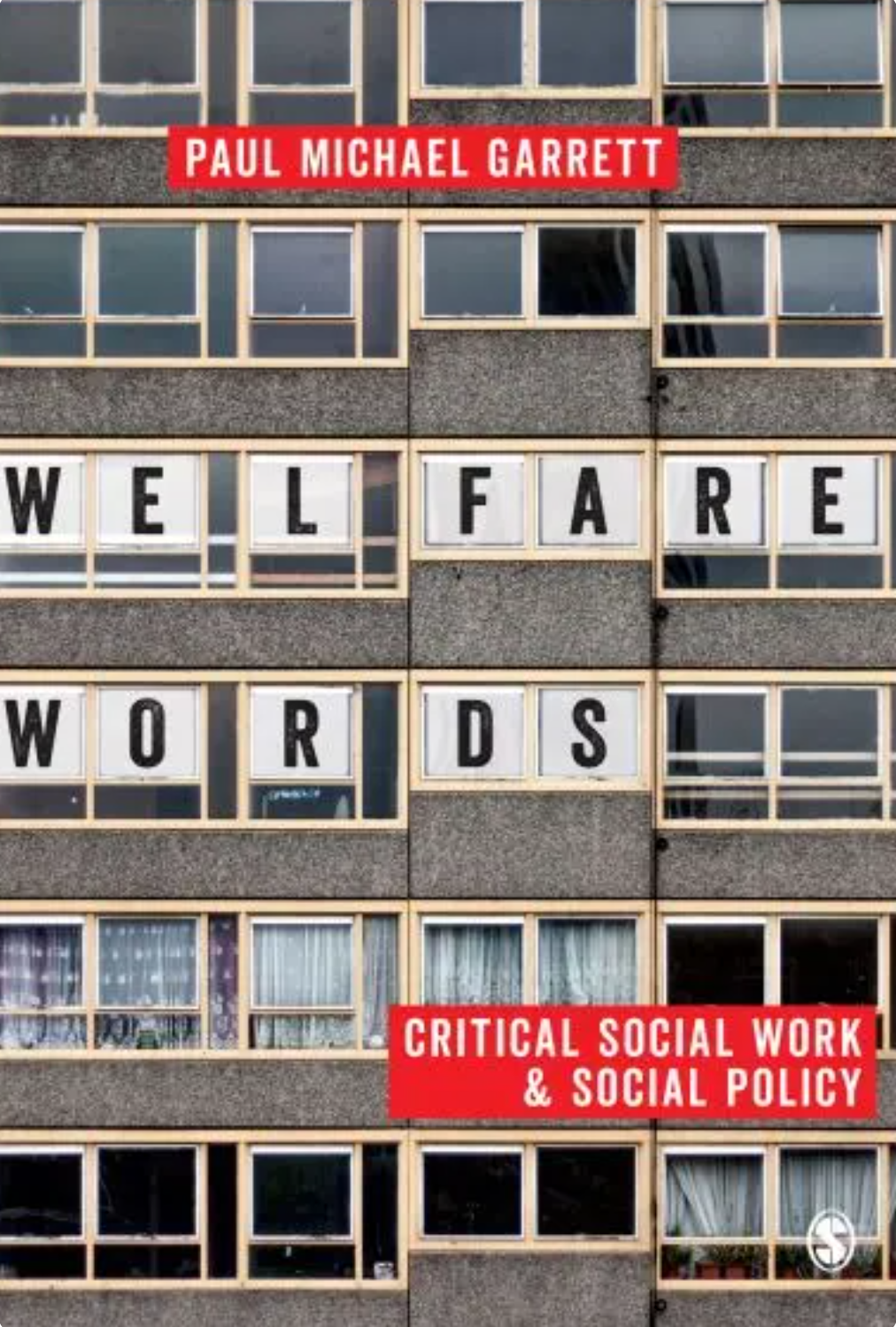
Paul Michael Garrett (2018) Welfare Words, Critical Social Work and Social Policy, London, SAGE
‘Rigorous, meticulously researched and edgy, Garrett’s new book seeks to understand the ideology underlying welfare words and by doing so, exposes the power and oppression operating through them. Read this book; it is the antidote to those who say that social work cannot be both a deeply intellectual and social justice-engaged endeavour’.
Donna Baines, University of Sydney, Australia
‘This is an engaging and engaged revisiting of the cultural excavation of ‘keywords’ pioneered by Raymond Williams. Garrett presents an impassioned and thorough dissection of some of the most important ‘keywords’ of our time, the highly coded lexicon of so-called welfare reform. What you will learn about the histories of containment and struggle sedimented within each term will enrage and energise – get reading, get angry, get ready’.
Gargi Bhattacharyya, University of East London, England
‘Paul Michael Garrett's important new book highlights the power of language when it comes to social welfare. Focusing on some of the most crucial keywords of welfare discourse in the neoliberal era, he plots their politics, illuminating their complicity in enacting disciplinary practices of client subordination, but also how their incompleteness leaves an opening for resistance and revision. His politically engaged linguistic interventions help us think about how to take steps toward less oppressive and more affirmative forms of service provision. This is a must read for social workers and social theorists alike, especially if they are interested in moving beyond the strictures of neoliberalism's oppressive disciplinary regime’.
Sanford F. Schram, Hunter College, City University of New York (CUNY), United States
‘Paul Michael Garrett’s Welfare Words takes a modern, fresh look at the language of welfare. He calls upon the reader to re-visit the impact of language upon welfare choices and interventions and in doing so makes an accessible and relevant call to arms to challenge inequality and social exclusion. This book will be the go-to text for students of social work and social policy for many years to come. It is an outstanding text and highly recommended’.
Lel Meleyal, University of Sussex, England
‘A must-read for critical social policy theorists but also for anyone alarmed at how neoliberal capitalism has stigmatized every aspect of social rights. Garrett’s lens of analysis of welfare keywords – dependency, underclass, social exclusion, resilience ‒ brings out sharply how neoliberal language stereotypes and marginalizes working class people and steers deep social problems into the woefully inadequate channels of individualism. Welfare Words provides a timely counter-voice to the neoliberal policies which have devastated our post-austerity world’.
Marnie Holborow, Dublin City University, Republic of Ireland
‘Paul Michael Garrett's new book provides valuable insights into the role of cultural and ideological forces in shaping a society's characterization of human needs and in developing policy responses to persistent social and economic issues. The book begins with an in-depth analysis of these forces and then applies its sophisticated conceptual framework to contemporary problems such as welfare dependency, social exclusion, and social care. In an era in which language, facts, and "truth" are increasingly distorted to rationalize regressive approaches to social welfare, the book provides readers with a clearer understanding of the origins and implications of anti-welfare perspectives and with an alternate lens to interpret contemporary social and political phenomena’
Michael Reisch, Daniel Thursz Distinguished Professor of Social Justice, University of Maryland, USA
‘This is an original and insightful book, which offers us a fresh perspective on some of the key themes and challenges in social work. It will prompt new thinking and provide practitioners with important critical tools to support their interventions’.
Roger S. Smith, University of Durham, England
‘Garrett’s book offers a comprehensive approach to the study of aocial policy in social work, encouraging readers to think critically about key words in their wider historical, political and cultural context. Drawing on an innovative conceptual lens in which to view social welfare, this is a key text for critical social work and social policy’.
Karen Roscoe, University of Wolverhampton, England
‘Garrett invites scholars, students and professionals to think about the role of language in welfare decisions [and] he provides valid instruments to cultivate a new way of thinking about welfare issues, new modes of resistance and political approaches “in and beyond social work and policy”’
Francesca Bragaglia, Urban Research & Practice, 2018
‘The premise of Paul Michael Garrett’s captivating new book, Welfare Words, is that we need to track back through the words we use to talk about welfare, to understand the ways that those words are deployed today, by whom, and to what effect…Underpinning Garrett’s book is an important theoretical discussion of hegemony, which as cultural studies scholars have argued is a process that works by neutralising competing perspectives and recruiting strategic consent and compliance. Indeed, the fruitful dialogue which has opened up between cultural studies and critical policy studies is showcased throughout this book. Garrett makes judicious use of these interdisciplinary debates to demonstrate how, and why, particular ideas seem to “stick” and “take hold” of our welfare imaginaries…This is a fascinating and rich book, which documents the central place of language in the (re)production of social order and the importance of welfare words in delineating the parameters of our collective imagination’.
Tracey Jensen, Critical Social Policy 2018
‘This is a significant new work. It highlights the crucial importance of the power of “welfare words”. It maps the development and use of these terms against a backdrop of welfare retrenchment, increasing inequality and austerity. It provides a clear insight into the way that a neoliberal vocabulary of welfare has played a powerful role in structuring debates in these fields. It is a well written and argued text, which is superbly researched. It is essential reading for all those interested in developing a critical social work mode of practice but also those with an interest in critical social policy. There is clearly scope for a second volume that examines a further series of keywords’.
Ian Cummins, The Sociological Review, January 2019
‘Garrett's book is intellectually compelling as well as inspiring in the way it systematically exposes the neoliberal myths in unequal societies. It will inspire the readership to work for social justice in social policy and society’.
Niels Rosendal Jensen, European Journal of Social Work, April 2019
‘Garrett’s book critically examines the language of welfare to enable consideration of the historical, political and cultural standpoints that underpin welfare discourses. Through employing the phrase “Welfare Words” he invites us to analytically examine (or re-examine) the power and motivations contained within welfare discourses. Garrett provides the reader with, an insightful consideration of the role of language in social welfare service provisions. The book succeeds in clearly demonstrating how neoliberal ideology oppresses and blames and, in doing so, it dispels neoliberal discourse –challenging the reader to reframe the language of oppressive practice norms’.
Kelly J. Smith, Aotearoa New Zealand Social Work, 2019
‘What I found most striking about this book was the way Garrett shows the changing meanings of keywords over time and in relation to wider social developments. Many terms now used to maintain a neoliberal agenda and societal status quo, often had more progressive and, often, revolutionary meaning behind them. Such an insight should alert us to the need not to take any term at face value but interrogate it in order to discover what it signifies at any historical juncture and particular social context. Garrett has provided us with a valuable analysis of the language of welfare and of the political uses and misuses of keywords that are ubiquitous within the field of social welfare, social policy, social work and the wider public. I highly recommend it for all levels of study within such disciplines as well as those of politics, sociology, media and cultural studies. It is also required reading for academics and politically engaged members of the public, indeed anyone with an interest in, understanding contemporary society’.
Kenneth McLaughlin, Journal of Political Power, 2019
‘Welfare Words is vital reading for all social workers, and indeed any helping professionals engaged in supporting people who are impoverished, excluded from the labour market and/or adversely impacted by burgeoning wealth inequality. Hence Welfare Words holds important implications for all fields of social work practice…The theoretical material that informs the book is brought to life with well-chosen examples of contemporary issues, debates and events in the UK, USA and European contexts primarily, as well as some examples from Australia and New Zealand. This diversity of contexts is a strength: the examples are engrossing and easily transferable across nations where neoliberalism prevails….The quality of the critical scholarship of Welfare Words is excellent. We thoroughly recommend this text to social work students, educators and practitioners alike for opening a door to critical reflection and problematisation of the words and concepts that drive social policy and social work practice’.
Christine Morley & Selma MacFarlane, Critical and Radical Social Work, 2019
‘Garrett offers a comprehensive approach to studying social policy in social work and encourages readers to think critically about keywords in their broader historical, political, and cultural context. His politically engaged linguistic interventions help us think about how to take steps towards less oppressive and more positive forms of service provision….[It] can be recommended to readers because it is an original book, which seeks to understand the ideology underlying welfare words, and by doing so, exposes the power and oppression operating through them. The book highlights the power of language when it comes to social welfare and it will prompt new thinking’.
Barbora Gřundělová, Czech and Slovak Social Work, 2019
‘The intended audiences for the book are both graduate-level and final year undergraduate students in social work and social policy, and perhaps also those in education, criminology, and health…Welfare Words is an ambitious work, one that can be read as a selective history of the recent past, as a demonstration of depth-style analysis, as the intellectual biography of a particular scholar, and as an invitation to dialog on shared matters of concern’.
Tina Wilson, Journal of Progressive Human Services, 2019
‘Although focused upon the UK as the site of analysis, this is a book that will be a really valuable resource for anyone teaching in schools, colleges and universities globally for the way it scrutinizes and problematizes a language of violence which has become normalized. It will particularly useful for those who teach young people without a memory of the struggles in defence of the welfare state as it once was, and who see the problems of the horribly unequal world we are living in but do not have the words and concepts to connect up the things happening around them’.
Stephen Cowden, Social Work Education, 2020
‘Paul Michael Garrett, an acclaimed author in the field, debates the impact of the neoliberal agenda on inequality and marginality…Garrett urges social workers to think critically about the contradictions that confront them in contemporary political and welfare systems and to hold to the profession’s principles of intervention within an increasingly divided society; and acknowledge how neoliberal practices demonise social problems and intensify vulnerability and marginality. Garrett’s book is an essential text for social workers seeking to understand the complexity of contemporary practice and the external forces that challenge its integrity. It is an essential addition to contemporary social work discourse’.
Rosemary Sheehan, Australian Social Work, 2021
‘Although focused upon the UK as the site of analysis, this is a book that will be a really valuable resource for anyone teaching in schools, colleges and universities globally for the way it scrutinizes and problematizes a language of violence which has become normalized. It will particularly useful for those who teach young people without a memory of the struggles in defence of the welfare state as it once was, and who see the problems of the horribly unequal world we are living in but do not have the words and concepts to connect up the things happening around them’.
Stephen Cowden, Social Work Education, 2020

Paul Michael Garrett (2018) Social work and social theory, Bristol, Policy Press (Second & Expanded Edition)
‘Paul Michael Garett’s excellent book has already become a social work classic. His work not only skilfully navigates complex theoretical debates but it also bridges the persistent and pervasive gap between social work theory and practice’.
Vasilios Ioakimidis, Professor of Social Work, University of Essex, England
‘The second edition of Garrett’s insightful text provides a solid conceptual foundation for the development of critical social work at a time when it is more necessary than ever’. Michael Reisch, Daniel Thursz Distinguished Professor of Social Justice, School of Social Work, University of Maryland, USA
‘A necessary and important book that explains with passion, wit and insight the links between social theory and social work practice; it will be invaluable to students and practitioners alike’.
Gary Walker, Principal Lecturer, Childhood and Early Years, Leeds Beckett University, England
‘In this revised and expanded edition Garrett offers a rich and insightful exploration of essential social theory for social work which will be a vital resource for social work educators and students’.
Liz Beddoe, Associate Professor, University of Auckland, Aotearoa New Zealand.
‘Located in Ireland for the past two decades, Paul Michael Garrett is one of the most respected and prolific social work scholars writing on neoliberalism, the welfare state and social work…In this timely second edition…he both updates the text and, in a new chapter, critically engages with the work Foucault…Confronting what the author terms “unthinking neoliberalism”, the analytical framework…is informed by the focal argument that a “better social work can exist within an economic and social system that puts people before profit”…Thus, social work scholars who recognize the importance of critical social theory and want to engage their students in ‘bigger picture’ debates should foreground this book in their reading lists as it is an absolutely vital teaching aid prompting debate on an complex array of issues impacting on social work and, more broadly, social policy. Scholarly and passionate, Social Work and Social Theory is an excellent book which will strengthen critical and radical social work thought and nurture stimulating debates in, and beyond, the profession’.
Maria Pentaraki, Queens University Belfast, Northern Ireland, Critical Social Policy
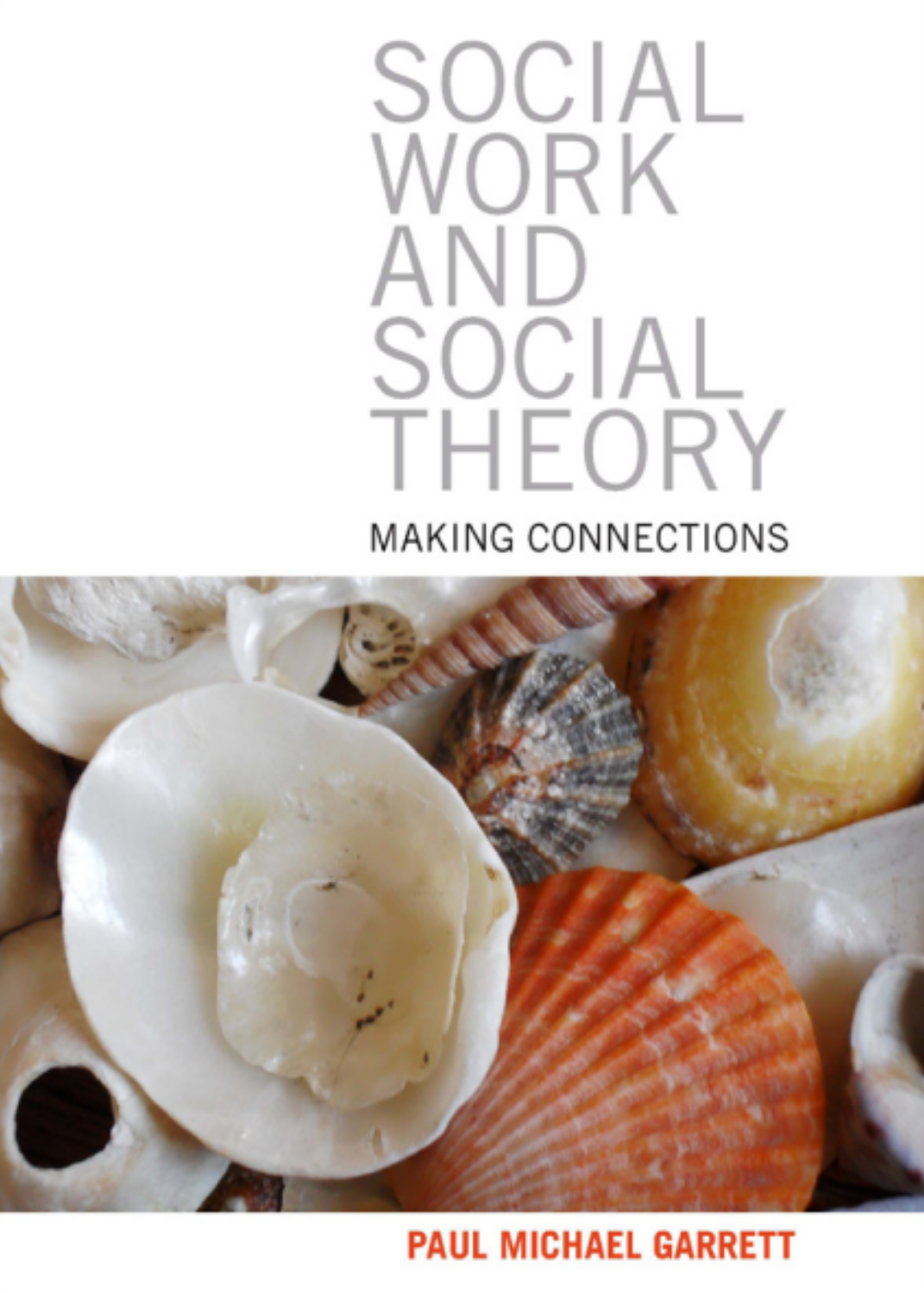

Paul Michael Garrett (2013) Social work and social theory, Bristol, Policy Press
‘Paul Michael Garrett’s Social Work and Social Theory is a wonderfully rich reflection on the uses of social theory to critically contextualize social work practice. Drawing on a wide range of contemporary theorists, the book insightfully shows that theory can help social workers rethink the commonly accepted understandings of their roles nand responsibilities today’
Sanford Schram, Bryn Mawr College, Graduate School of Social Work and Social Research, USA
‘This book fills a gap in the increasingly a-theoretical literature of social work. It provides clear and incisive analyses of major critical theorists and demonstrates how their work can shape progressive practice’.
Michael Reisch, Daniel Thursz Distinguished Professor of Social Justice, University of Maryland, USA
‘As neoliberalism brings “managerialism” into social services, Garrett’s highly accessible and provocative conversation with theorists importantly opens the door to critical thinking about the role of government, the functioning of social agencies and the capacity of social workers to deliver services to people in need. Garrett’s thoughtful and indepth engagement with major social theories should encourage social workers, who sit at the intersection between the individual and the state, to assess - and to challenge - the status quo’.
Mimi Abramovitz, Silberman School of Social Work at Hunter College and the CUNY Graduate Center, USA
‘This is a well-written book by a respected author. It demonstrates a wealth of relevant knowledge and provides a clear overview of a highly complex field’.
Neil Thompson, Avenue Consulting, UK
‘Social Work and Social Theory is…a brave and inspired attempt to argue for a better engagement with the potential of critical theory to improve our understanding of the social work labour process [and] the corrosive impact of neoliberalism on all spheres of life…. It is a fascinating and well-written read... The author’s ornate style of writing, enthusiasm and keen endeavour to keep the material up to date holds the reader’s attention’
Malcolm Carey, Critical Social Policy, 33 (3), 2013
‘Paul Michael Garrett has provided trenchant critiques of the changes forced onto social work since the onset of neoliberalism - a political philosophy that promotes, among other things, privatisation and free trade - in the late 1970s. His call has always been for a more critical and creative response to what has happened to social work and the people it serves...this book is essential reading for those wanting a more radical/critical social work’.
Steve Rogowski, Community Care, 5 Feb, 2013
‘Garrett has set himself an ambitious task in writing a book which draws on a broad range of social theorists in examining what relevance they have to social work as an academic subject, a professional practice and as a response to problems which will inevitably emerge under the present social order. The strengths in this text lie in Garrett’s own evident passion for the topic and his acute observations of the theories discussed… I believe this book is an excellent contribution to social work literature in Ireland and further afield and may be what social work needs, if not necessarily what it wants’.
Darren Broomfield, Irish Left Review, May 2013.
‘The book is extremely well structured...written in a way that is readily accessible and intelligible and is presented clearly enough for the reader to...develop their own critique despite the fact that many of the selected theorists are known sometimes for their use of impenetrable prose...Refreshingly, not all selected theorists are those likely to be familiar to all readers and this combination of “predictable” or familiar aspects with newer perspectives is a real strength of this book...undeniably, a “good read’ and should certainly stimulate thoughts and debates’.
Cath Holmström, Social Work Education, 2013
‘Garrett has highlighted for us once again the importance of looking beyond the standardised parameters of institutional practice….seeking inspiration and indeed practical insights from a wider range of sources than are commonly utilised...As in his previous work, the author has achieved a precious objective in successfully making us think, and think critically for practice’.
Roger Smith, Journal of Power, 2013
‘This stand-out book…richly and compellingly reminds readers that social and critical theory allow us to understand and unpick the complexity, politics and power of social inequality…The fact that Garrett is able to make the ideas of these sometimes challenging theorists a relatively ‘easy read’ is an achievement in itself. However, what makes [it] so useful to social work is the convincing way [he] enables and facilitates dialogue both between the theorists and in relation to social work. The book intelligently reminds of the transformative ideals and values of social work which inevitably engages one in thinking deeply about the social, cultural, ideological and economic influences impacting upon contemporary social work practice….It is convincingly argued that critical theory is a ‘vital resource for . . . progressive social work’ in that it facilitates new understandings and deep reflection. The book is…invigorating, relevant and successful in generating a positive will towards politically informed and activist social work. It is highly recommended’.
Lel Meleyal, British Journal of Social Work, 2015
‘This book develops important links between direct social work practice and critical social theory. [It is] written in a way that encourages thinking about how social theories and theorists relate to everyday practice in social work, as opposed to concentrating on theories of “how to do” social work…In terms of structure, the book is accessible and could easily be used in social work education as tool a for stimulating critical analysis’.
Laura Meehan, Critical and Radical Social Work, 2015
‘Garrett’s book continues the tradition of radical social work and his analysis emphasizes, by selection of social theorists, the changes since the 1970s. Due to the great “recession” discussions like this are more urgent’.
Niels Rosendal Jensen, European Journal of Social Work, 2015
‘Internationally speaking, Paul Michael Garrett is known more as an academic child protection researcher, but this work displays his extensive theoretical awareness…During this era, where the global market economy is grinding out increasing economic inequality, political aspirations are converted into “neutral regulatory measures” and the “social” is disappearing [his] Social Work and Social Theory is more than welcome’.
Timo Harrikari, Nordic Social Work Research, 2016
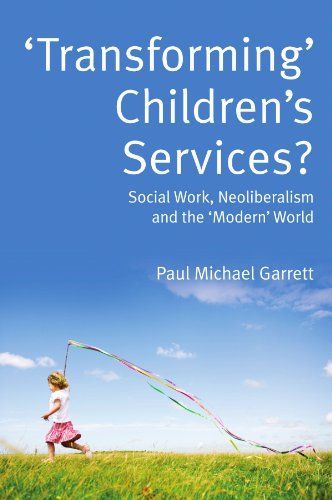
Paul Michael Garrett (2009) ‘Transforming’ Children’s Services? Social Work, Neoliberalism and the ‘Modern’ World, Maidenhead, McGraw Hill/Open University
‘This is a forensic dissection of New Labour’s approach to transforming children’s services. Garrett brings together politics, politics and plans in a resolutely critical engagement with the futures currently being made both for social workers and for the families and children who may need their services’
Professor John Clarke, Professor of Social Policy, The Open University
Publisher’s website: http://www.mcgraw-hill.co.uk/html/0335234259.html
‘Paul Michael Garrett writes with verve, commitment and clarity. His new book on transforming Children's Services will make a significant and lasting impression on the social work literature’
Professor Stephen Webb, Director of Institute of the Advanced Study for Humanity (IASH) University of Newcastle, Australia.
Publisher’s website: http://www.mcgraw-hill.co.uk/html/0335234259.html
‘This is an excellent book and one of the best I have read for some time. It is a must have for all social work and social policy students and practitioners. Policy makers and managers should also read and digest this, even though they will probably find large parts an uncomfortable read’.
Steve Rogowski, Professional Social Work, December, 2009
‘I found much in the book to like and admire...this is a useful and intelligent contribution’.
Chris Beckett, British Journal of Social Work, 40 (3), 2010
‘Paul Michael Garrett’s designedly critical analysis is timely, offering a fast-paced, hard-hitting, thought-provoking critique...this book is sure to satisfy those looking for less of “surface” and more “depth” explorations…I am sure that ‘Transforming’ Children’s Services? will become essential reading for social work and social policy students throughout the UK and, indeed, internationally given that Canada, America, Australia and New Zealand share in cognate systems of child welfare and protection’.
Karen Broadhurst, Critical Social Policy, 30 (3), 2010
‘There is much to ring true to every reader and will almost certainly stimulate lively discussion; it that sort of book...Because we are dealing with social problems, the users of services will always have a high political profile and everyone will have a view on what should be done...So we should be grateful to Paul Michael Garrett for maintaining our awareness of these dangers and inquiring more deeply into the endless stream of ephemeral ideas that mark so many current policy discussions’.
Roger Bullock, Journal of Children’s Services, 5 (1), 2010.
‘I recommend the book to all who work in or have an interest in responding to the needs of vulnerable children and families, and who question a concerning lack of humanity in relevant contemporary government policy’
Rosemary Sheehan, Australian Social Work, 64 (4), 2011.
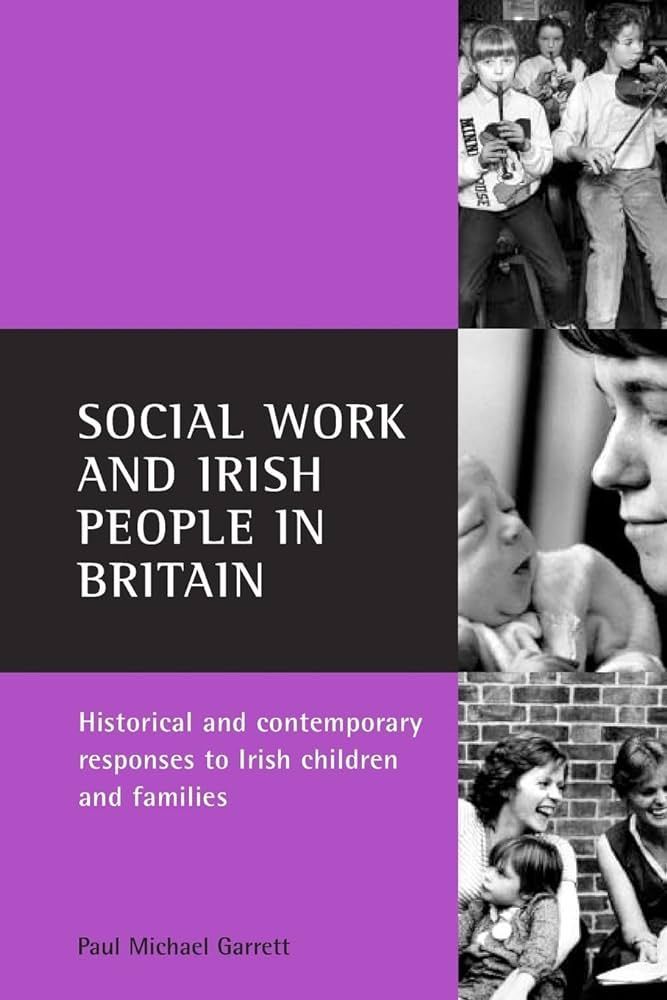
Paul Michael Garrett (2004) Social Work and Irish People in Britain: Historical and Contemporary Responses to Irish Children and Families, Bristol, Policy Press
‘[T]he book is original in its sources, methods and ideas. The style and organisation are easy to understand and its conclusions provide valuable insights and summaries. Paul Michael Garrett has provided a powerful case to the social work profession and society in general for more awareness of the perceptions of Irish people’
Andy Hare, St. Basil’s, Birmingham Adoption & Fostering (2004) 28 (3), pp. 85-86
‘This is an extremely interesting and useful book for anyone involved in planning or delivering family services to people from an Irish background…The book covers a span of almost a one hundred years, from the 1920s until the present day…I can only welcome this book…It should be essential reading for those providing social services to families with Irish roots…I have no doubt that the findings of the excellent research that formed the basis of the book will enhance our understanding of Irish women, who have emigrated to another country for social and economic reasons, and will stimulate the wider debate on working with families whose home is in Britain but whose cultural roots are elsewhere’.
Pauline M. Prior, Queens University Belfast, Journal of Social Policy (2005) 34 (1)
'[T]his book is an excellent resource which I highly recommend to practitioners, students and educators in the field of social work/care fields. It offers invaluable insights and perspectives on social work with the largest ethnic minority in Britain and makes an essential contribution to our continuing understanding of anti-oppressive practice. It should be recommended reading on social work courses and accessible on the bookshelves of practice agencies. Whilst the content focuses on the British experience this book also provides useful information and insights for practitioners and educators internationally'
Louise O'Connor, Senior Lecturer, London South Bank University Social Work Education (2005) 24 (1), pp. 148-50.
‘Overall, this is an important book in making, for the first time, the case for a more sensitive and culturally competent form of social work practice with Irish families in Britain, and by its very presence should challenge practitioners to review their interactions with Irish clients. In making clear the complexities of Irish identity, between emigrants, English-born and mixed-background Irish, it highlights the need for practitioners to work around client’s perceptions of their identity (or identities) rather than making expert assumptions. Hopefully, this will be the first of many publications that will raise awareness and motivate workers to develop (and by articulating, make available) their expertise so that Irish children and their families are no longer considered “just like the English”’.
Trish Walsh, Trinity College Dublin Irish Studies Review (2005) 13 (4), pp. 581-584.
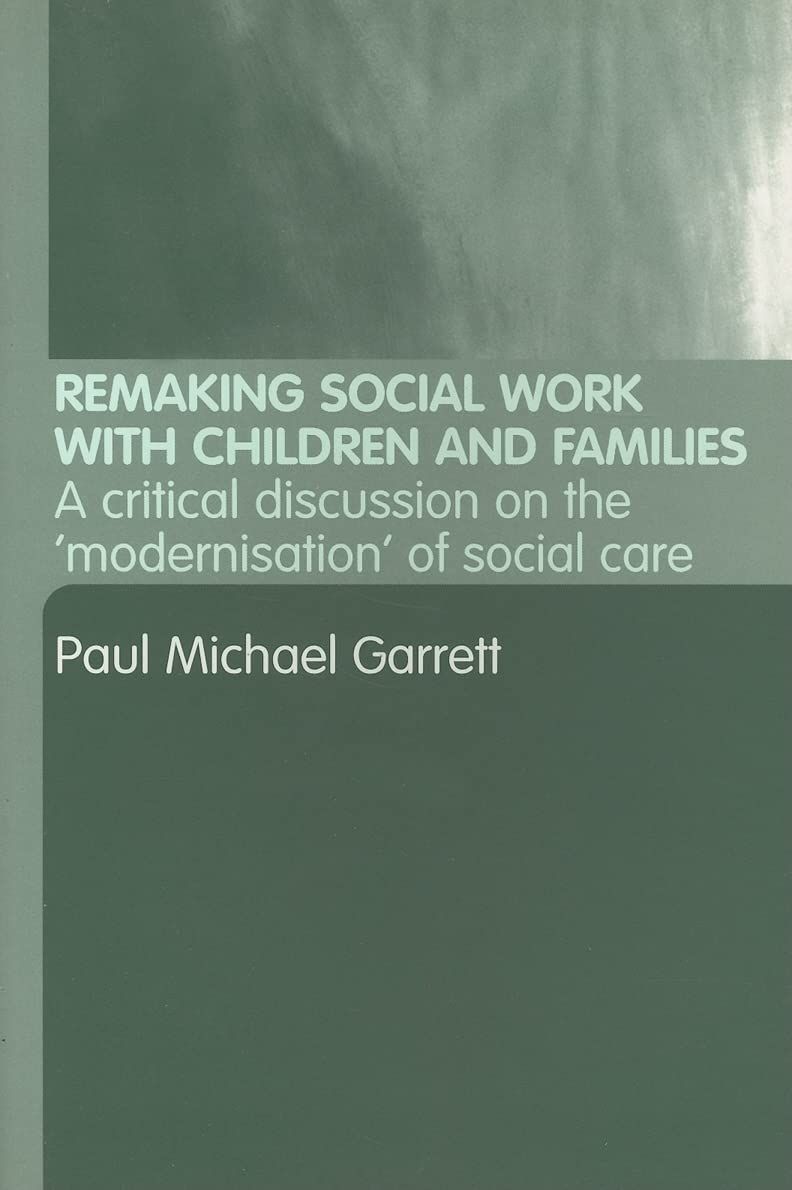
Paul Michael Garrett (2003) Remaking Social Work with Children and Families: A critical discussion on the ‘modernisation’ of social care, London, Routledge.
‘[A] book for those who want to understand the immediate past, in the hope that it
might enlighten the future for children’
Chris Hanvey, UK Director of Operations, Barnardos Community Care (2003) 27 November
‘This is an excellent text for opening discourse between academics and researchers on
data-gathering methods, which will truly assist social workers in their day-to-day work
with clients, while simultaneously providing accountability. The text also facilitates
teaching critical thinking to students’
Diane Jacobs, Tulane University, New Orleans,The British Journal of Social Work (2004) vol. 34 (4)
‘[T]he account is a passionate and through one…[T]his makes a real contribution to
critical writing on statutory social work in the UK, or more specifically, on social work
with children and families in England and Wales. Garrett builds his analysis from the
basis of current social work methods and, and in doing so, opens a window on the
discourses which underpin social work practice today’
Viviene E. Cree, University of Edinburgh European Journal of Social Work (2004) vol. 7
‘It provides a sound historical account of significant developments in children’s social
work in England and Wales during the 1990s and in the early years of this century,
including sections on looked after children, joint working in child protection, adoption
and issues of race and ethnicity. It concludes with a valuable evaluation of the “emergent new professionals” and in particular a critical review of the Connexions Service. In the concluding chapter it anticipates some of the themes of the Green Paper such as Children’s Trusts and the Identification, Referral and Tracking system…The book
could provide a useful overview of recent policy and practice developments for student
social workers and could usefully stimulate class discussions in each of the areas it
addresses’.
Chris Mills, NCPCC Social Work Education (2004) vol. 23
‘Many will find a resonance in his reminder to professionals that it can be their duty to
dissent from the currently dominant political view. It is useful to have a senior academic
in the field articulate the need for such autonomy and detachment’
Julie Miller, Consultant Paediatrician, St James’ Hospital, Leeds Child Abuse Review (2004) vol. 13 (3)
‘This is a well-written, accessible and thought provoking book, which deserves a
wide audience. It would be of interest to social work students, social care professionals,
policy makers and academics’
Pamela Attree, Institute of Health Research, Lancaster University Sociological Research Online (2004) 9/2 http://www.socresonline.org.uk/9/2/garrett.html
‘Paul Michael Garrett has been a consistent – and consistently stimulating – critic of the
modernisation agenda in social work with children and families for several years now.
[He] is widely read, and it shows. He brings a wide range of theoretical and factual
sources to bear on his argument. His approach is intended to be critical but constructive, not simply debunking. It is also engaged from the beginning with the ethical purpose of social work with children and families’
Nigel Thomas, University of Wales Children & Society (2005) Vol. 19

